Joe Biden holds to Kabul August 31 deadline despite criticism
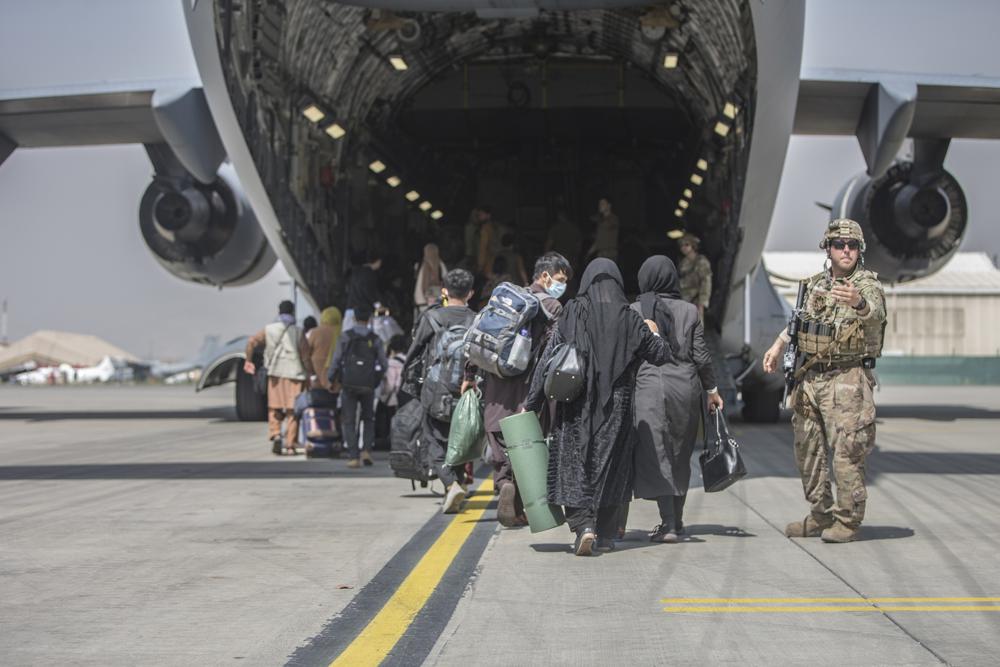
U.S. President Joe Biden declared Tuesday he is sticking to his August 31 deadline for completing a risky airlift of Americans, endangered Afghans, and others seeking to escape Taliban-controlled Afghanistan. The decision defies allied leaders who want to give the evacuation more time and opens Biden to criticism that he caved to Taliban deadline demands. “Every day we’re on the ground is another day that we know ISIS-K is seeking to target the airport and attack both us and allied forces and innocent civilians,” Biden said at the White House, referring to the Islamic State group’s Afghanistan affiliate, which is known for staging suicide attacks on civilians. He said the Taliban are cooperating and security is holding despite a number of violent incidents. “But it’s a tenuous situation,” he said, adding, “We run a serious risk of it breaking down as time goes on.” The United States in recent days has ramped up its airlift amid new reports of rights abuses that fuel concern about the fate of thousands of people who fear retribution from the Taliban and are trying to flee the country. The Pentagon said 21,600 people had been evacuated in the 24 hours that ended Tuesday morning, and Biden said an additional 12,000 had been flown out in the 12 hours that followed. Those include flights operated by the U.S. military as well as other charter flights. Biden said he had asked the Pentagon and State Department for evacuation contingency plans that would adjust the timeline for full withdrawal should that become necessary. Pentagon officials expressed confidence the airlift, which started on August 14, can get all Americans out by next Tuesday, the deadline Biden had set long before the Taliban completed their takeover. But unknown thousands of other foreign nationals remain in Afghanistan and are struggling to get out. The Taliban, who have wrested control of the country back nearly 20 years after being ousted in a U.S.-led invasion after the 9/11 attacks insist the airlift must end on August 31. Any decision by Biden to stay longer could reignite a war between the militants and the approximately 5,800 American troops who are executing the airlift at Kabul airport. In Kabul, Taliban spokesman Zabihullah Mujahid told a news conference the U.S. must stick to its self-imposed deadline, saying “after that, we won’t let Afghans be taken out” on evacuation flights. He also said the Taliban would bar Afghans from accessing roads to the airport while allowing foreigners to pass in order to prevent large crowds from massing. At the Pentagon, spokesman John Kirby said Aug. 31 leaves enough time to get all Americans out, but he was less specific about completing the evacuation of all at-risk Afghans. He said about 4,000 American passport holders and their family members had been evacuated from Kabul as of Tuesday. “We expect that number to grow in coming days,” Kirby said. With the full U.S. withdrawal looming, the Pentagon said several hundred U.S. troops have been withdrawn because they are no longer needed to complete the evacuation mission. Kirby said these are headquarters staff, maintenance personnel, and others. “It will have no impact on the mission at hand,” he said. It’s unclear how many Americans who want to leave are still in the country, but their status is a hot political topic for Biden. Some Republicans bristled Tuesday at the U.S. seeming to comply with a Taliban edict. “We need to have the top priority to tell the Taliban that we’re going to get all of our people out, regardless of what timeline was initially set,” said Rep. Steve Scalise of Louisiana. And Democratic Rep. Adam Schiff of California, chairman of the House Intelligence Committee, told reporters Monday that “it was hard for me to imagine” wrapping up the airlifts by the end of the month. One of the main refugee groups resettling Afghan evacuees in the United States said many people, including some American citizens, still were finding it impossible to get past Taliban checkpoints and crushing throngs outside the airport. “The United States cannot pat itself on the back for a job half-done,” said Krish O’Mara Vignarajah, president and CEO of Lutheran Immigration and Refugee Service. Biden decided in April that he was ending the U.S. war, which began in October 2001. Former President Donald Trump had earlier agreed in negotiations with the Taliban to end the war in May. However, Biden waited until the Taliban had swept to power this month, following the collapse of the U.S.-backed government and its army, to begin executing an airlift. Tragic scenes at the airport have transfixed the world. Afghans poured onto the tarmac last week and some clung to a U.S. military transport plane as it took off, later plunging to their deaths. At least seven people died that day, and another seven died Sunday in a panicked stampede. An Afghan soldier was killed Monday in a gunfight. British Prime Minister Boris Johnson said the Group of Seven nations will not recognize a Taliban government unless it guarantees people can leave the country if they wish, both before and after the August deadline. A day earlier, the director of the U.S. Central Intelligence Agency, William Burns, met with a top Taliban leader in Kabul. The extraordinary meeting reflected the gravity of the crisis and America’s need to coordinate with a Taliban group it has accused of gross human rights abuses. For now, the U.S. military coordinates all air traffic in and out of the Kabul airport, but the Taliban will take over thereafter the U.S. pullout. Meanwhile, a U.S. official said Burns, the CIA director, met with Taliban leader Mullah Abdul Ghani Baradar — an extraordinary moment for the U.S. spy agency, which for two decades targeted the Taliban in paramilitary operations. It was not clear what exactly they discussed. The CIA partnered with Pakistani forces to arrest Baradar in 2010, and he spent eight years in a Pakistani prison before the Trump administration persuaded Pakistan to release him in 2018
Alabama leads nation in eliminating Chinese Communist Party influence in higher education

Lawmakers hailing from both sides of the aisle in Washington are shifting their focus to an increasingly relevant threat towards national security and academic freedom: Confucius Institutes. Funded by the Chinese Communist Party (CCP), these institutes have expanded to over 67 individual university campuses nationwide, with an additional 500 Confucius Classrooms at K-12 schools. Ambiguously labeled as cultural centers, Confucius Institutes have simultaneously proven themselves to be a vehicle of China’s political agenda through propaganda and intelligence gathering. Within these classrooms, historical events are only permitted to be discussed through a rosy lens towards the Chinese government, while documented events such as the 1989 Tiananmen Square protests, or the current human rights abuses against the Uyghurs, are prohibited from the entirety of classroom discourse. During a U.S. Senate Intelligence Committee hearing, Federal Bureau of Investigation (FBI) Director Christopher Wray confirmed that the FBI has observed China use “nontraditional collectors, especially in the academic setting” to engage in espionage and will continue to take “investigative steps” at Confucius Institutes. Additionally, the U.S. Department of State designated Confucius Institutes as “an entity advancing Beijing’s global propaganda and malign influence campaign on U.S. campuses and K-12 classrooms.” The state of Alabama has hosted two Confucius Institutes in its history; with established institutes at Alabama A&M University, Auburn University at Montgomery, and Troy University. Alabama A&M University’s Confucius Institute successfully closed in April 2021 after receiving notification of a potential loss of eligibility for federal funds. Other key actors in the state who advocated for the closure of Confucius Institutes include groups such as the College Republican Federation of Alabama as well as legislators Congressman Mo Brooks and State Representative Tommy Hanes (R-Bryant). Congressman Mo Brooks, a member of Alabama’s congressional delegation, was one of the initial Washington lawmakers to bring attention to the influence of Confucius Institutes. Brooks has served as an original cosponsor for the Higher Education Transparency Act, the Transparency for Confucius Institutes Act, the Foreign Influence Transparency Act, in addition to bipartisan effort, the Concerns Over Nations Funding University Campus Institutes in the United States (CONFUCIUS) Act. While the state of Alabama has made national headway in approaching the closure of Confucius Institutes within its state, not all of Alabama’s leading figures are zealous to join the national movement to limit foreign influence in the U.S. education system. Alabama House Bill 9 and Senate Bill 280, respectively, intended to cease funding of Confucius Institutes and were both opposed by Chair of the House Education Policy Committee, Terri Collins (R-Decatur), and Senator Jim McClendon. It was later revealed that Senator McClendon embarked on a 2015 Confucius Institute-sponsored trip to China. A number of former Alabama legislators, including a Troy University board of trustees member, also participated in the same Confucius Institute-sponsored international trip. Troy University continues to defend its relationship with its Confucius Institutes in a written statement, “Troy University’s association with the Confucius Institute has been positive, and we have seen no evidence of undue political influence from the Chinese government nor has there been any evidence of intellectual theft.” Time will tell if the state of Alabama will continue to lead the nation in defending national security and preserving academic freedom through the closure of the state’s last remaining Confucius Institute at Troy University.
State Department worried about defending ambassador
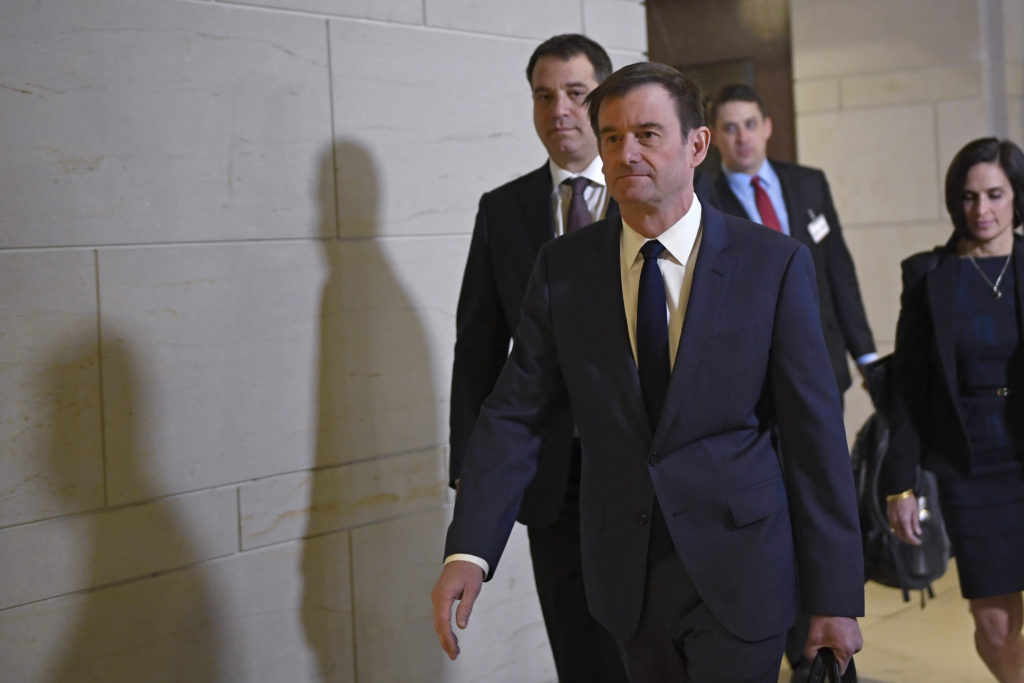
The State Department’s third-ranking official is expected to tell House impeachment investigators Wednesday that political considerations were behind the agency’s refusal to deliver a robust defense of the former U.S. ambassador to Ukraine. People familiar with the matter say the highest-ranking career diplomat in the foreign service, David Hale, plans to say that Secretary of State Mike Pompeo and other senior officials determined that defending Ambassador Marie Yovanovitch would hurt the effort to free up U.S. military assistance to Ukraine. Hale, who arrived Wednesday morning to testify behind closed doors, will also say that the State Department worried about the reaction from President Donald Trump’s personal attorney Rudy Giuliani, also one of the strongest advocates for removing the ambassador. Meanwhile, State Department Counselor T. Ulrich Brechbuhl, who was subpoenaed to appear before the impeachment panel, was on the plane with Pompeo, who departed early Wednesday morning for Germany. Two other witnesses who were scheduled for Wednesday — Russ Vought, the acting director of the White House Office of Management and Budget, and Rick Perry, the Energy secretary — are not expected to show up. Yovanovitch, who was removed from her posting in May, has already appeared before investigators in the impeachment inquiry into Trump. She detailed efforts by Giuliani and other Trump allies to push her out of Ukraine, testifying that a senior Ukrainian official told her that “I really needed to watch my back.” Hale is expected to shed more light on why the State Department did not step up to defend its top envoy in Kyiv. According to the people familiar with the matter, he will say he tried to distance himself and the department from the matter by removing himself from email chains about Yovanovitch. Hale, for example, never responded to an email sent by former top Pompeo adviser Michael McKinley urging Pompeo to speak out in defense of Yovanovitch after the White House released a partial transcript of Trump’s phone call with Ukrainian President Volodymyr Zelenskiy, the officials said. One official said Hale had “tried to take himself out of the loop on Ukraine.” But another official said Hale would defend Pompeo’s actions as “politically smart” for the State Department and its employees in the long run. The people familiar with the matter were not authorized to discuss Hale’s appearance publicly and spoke on the condition of anonymity. Hale, a fluent Arabic speaker who joined the foreign service in 1984, has served as ambassador to Lebanon, Pakistan and Jordan and in posts in Tunisia, Bahrain and Saudi Arabia. By Matthew Lee AP Diplomatic Writer. Republished with the permission of the Associated Press.
Democrats prep for open hearings, seek John Bolton testimony
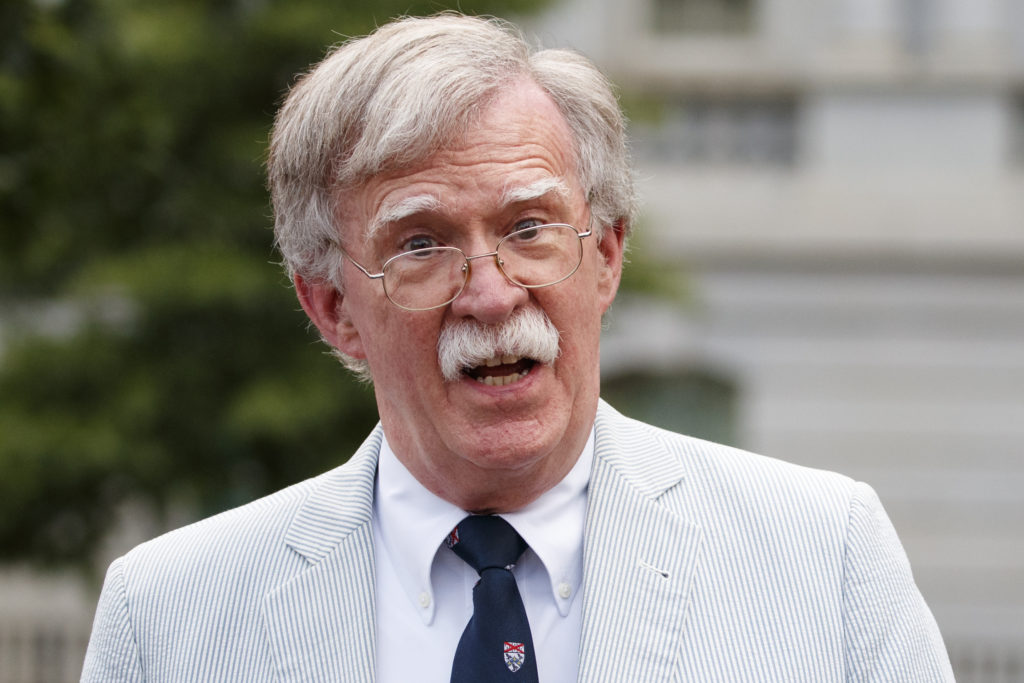
For only the fourth time in U.S. history, the House of Representatives has started a presidential impeachment inquiry. House committees are trying to determine whether President Donald Trump violated his oath of office by asking Ukraine to investigate political rival Joe Biden and his family, and to investigate the country’s involvement in the 2016 U.S. presidential election. A quick summary of the latest news and what’s to come: MOVING INTO PUBLIC VIEW The chairman of the House Intelligence Committee, Rep. Adam Schiff, told The Associated Press on Friday that the three committees leading the impeachment investigation plan to begin releasing transcripts of closed-door interviews as soon as early this week. The committees have interviewed current and former officials from the State Department and White House who have expressed concerns about Trump’s efforts to urge Ukraine to investigate Biden and his family. California Rep. Jackie Speier, a Democratic member of the Intelligence Committee, told CBS’ “Face the Nation” on Sunday that she expects one more week of closed-door interviews before committees move into open hearings. It’s so far unclear who will be asked to testify or how many hearings will be held. Leaders of the investigation say the hearings will be crucial to explain their inquiry to the American people. Schiff, Democrat-California said he hopes the testimony will eventually show “what the president did, why his misconduct is so serious” and how the “machinery of government” was pressed to help Trump influence the 2020 election. THE WHISTLEBLOWER A lawyer for the whistleblower who raised alarms about Trump’s dealings with Ukraine says his client has offered to answer written questions submitted by House Republicans.The surprise offer was made to Rep. Devin Nunes, the top Republican on the House Intelligence Committee. It would allow Republicans to ask questions of the whistleblower, who spurred the Democratic-led impeachment inquiry, without having to go through Schiff.Attorney Mark Zaid tweeted Sunday that the whistleblower would answer questions directly from Republican members “in writing, under oath & penalty of perjury,” part of a bid to stem escalating efforts by Trump and his GOP allies to unmask the person’s identity. Only queries seeking the person’s identity won’t be answered, he said. Nunes hasn’t commented on the proposal. Rep. Jim Jordan, an Ohio Republican and member of the House Judiciary Committee who has been highly critical of the impeachment process, said in a statement that written answers wouldn’t be sufficient to probe and cross-examine the whistleblower. The whistleblower raised concerns about Trump’s July 25 call with Ukrainian President Volodymyr Zelenskiy, in which he pressed Zelenskiy to investigate Trump’s political rivals. MORE BEHIND CLOSED DOORS As they prepare to go public, impeachment investigators are continuing to schedule private depositions. Democrats have called in 11 witnesses this week, including Energy Secretary Rick Perry and former national security adviser John Bolton. It’s unclear whether any of them will come to Capitol Hill. Perry is the first member of Trump’s Cabinet asked to appear before the House. His testimony is scheduled for Wednesday, according to an official working on the impeachment inquiry who spoke wasn’t authorized to publicly discuss the planning and spoke on condition of anonymity. Energy Department spokeswoman Shaylyn Hynes indicated Friday that Perry would not appear for the closed-door hearing but would consider testifying in a public session.On Bolton, Schiff said he “has very important information about the president’s misconduct that the American people should hear.” Other witnesses in the inquiry have described Bolton’s concerns as Trump urged the Ukrainian investigations. The committees have invited Bolton to appear Thursday but not issued a subpoena for his testimony. Trump says he’s not going to insist that Bolton not testify. Bolton’s lawyer has said he will not appear without a subpoena. “It’s up to him and it’s up to the lawyers,” Trump told reporters. The committees also have scheduled and subpoenaed other witnesses from the White House and State Department. They include David Hale, an undersecretary at the State Department who has been mentioned in previous testimony. Key witnesses last week included Alexander Vindman and Tim Morrison of the National Security Council. Morrison, who stepped down the day before his testimony, confirmed that military aid to Ukraine was held up by Trump’s demands for the investigations. But Morrison testified that there was nothing illegal, in his view, about the quid pro quo at the center of the impeachment inquiry. Vindman testified that he had raised concerns about Trump’s pleas. COURT BATTLES Democrats are also fighting impeachment battles in court, though they have indicated that they don’t want to delay the investigation as those cases proceed. One witness called by Democrats, former National Security Council deputy Charles Kupperman, has asked a judge to decide whether he must appear before Congress. Trump has said his administration will not cooperate, and Kupperman has said he is caught between the two. Kupperman’s lawyer, Charles Cooper, is also Bolton’s lawyer. He said Bolton could be added to the case. Republished with the permission of the Associated Press.
Trump administration backs bill to halt aid to Palestinians

The Trump administration declared its firm support Thursday for a bill that would suspend U.S. financial assistance to the Palestinian Authority until it ends what critics have described as a long-standing practice of rewarding Palestinians who kill Americans and Israelis. The State Department announcement comes nearly six weeks after the Senate Foreign Relations Committee backed the measure. The legislation, which is named after an American who was stabbed to death in Israel by a Palestinian, reflects bipartisan outrage over what lawmakers have termed a “pay to slay” program endorsed by the Palestinian Authority. “The Trump administration strongly supports the Taylor Force Act, which is a consequence of Palestinian Authority and Palestine Liberation Organization’s policy of paying terrorists and their families,” the State Department said. The department added that President Donald Trump “raised the need to end any part of this program that incentivizes violence against Israeli and American citizens with President Mahmoud Abbas last May in both Washington and Bethlehem.” But the Palestinian Authority has disputed the accusations and called the bill misinformed. Husam Zomlot, chief representative of the Palestinian General Delegation to the U.S., said last month that the program is more than 50 years old and is aimed at giving support to families “who lost their breadwinners to the atrocities of the occupation, the vast majority of whom are unduly arrested or killed by Israel.” One of the bill’s main sponsors, Sen. Bob Corker, R-Tenn., said the Palestinian Authority has created monetary incentives for acts of terrorism by paying monthly stipends of as much as $3,500 to Palestinians who commit acts of violence and to their families. The amount of the payment depends on the length of the jail sentence they receive for the crime, he said. Corker is chairman of the Foreign Relations Committee. Palestinians have argued that ending Israel’s occupation of the West Bank, Gaza Strip and east Jerusalem – lands that Palestinians seek for their state – is key to defeating terrorism. Taylor Force was an MBA student at Vanderbilt University in Tennessee and a West Point graduate who was visiting Israel in March 2016 when he was killed. Force was from Lubbock, Texas. His parents live in South Carolina. Sen. Lindsey Graham, R-S.C., said the Palestinian Authority praised Force’s killer as a “heroic martyr.” He estimated that the Palestinian Authority has paid $144 million in “martyr payments” over the years. Republished with permission from the Associated Press.
Rex Tillerson eyes cutting 2,300 jobs at State Department
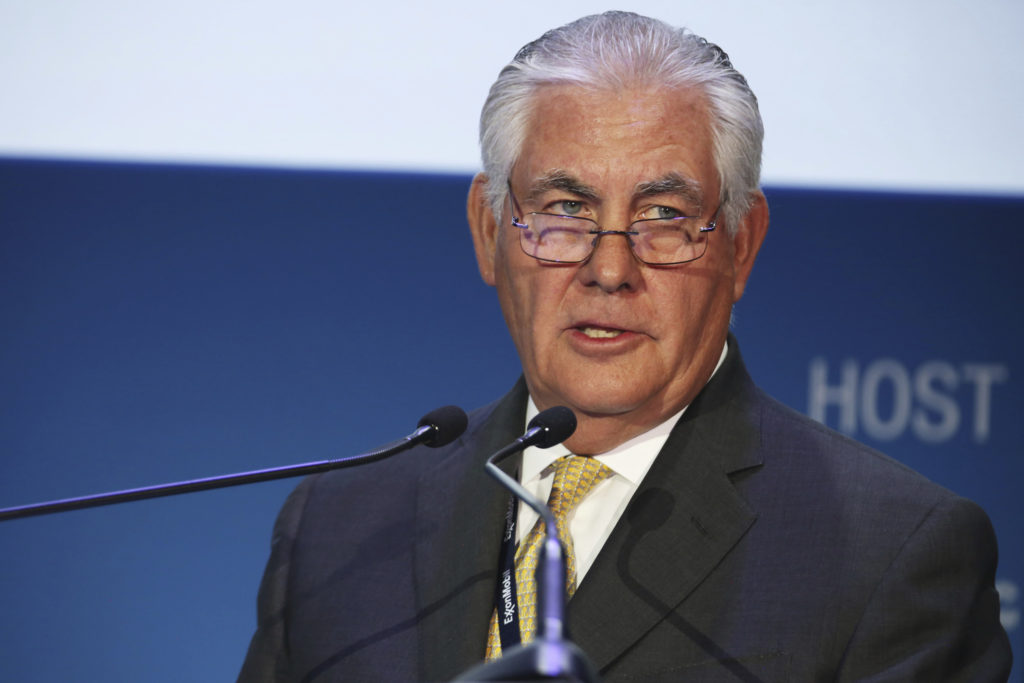
Secretary of State Rex Tillerson is proposing to eliminate 2,300 jobs as part of a plan to cut more than a quarter of the State Department’s budget for the next fiscal year, officials said Friday. The plan will almost certainly meet resistance from lawmakers opposing President Donald Trump‘s proposal to shrink the size of the federal government. Tillerson’s proposal reduces the number of new diplomats being hired and includes the State Department and U.S. Agency for International Development’s possible consolidation, according to officials briefed on the proposal. The staff cuts would amount to about 3 percent of the department’s roughly 75,000-strong workforce. The proposal is a response to the Office of Management and Budget’s call to slash the State Department and USAID budgets by 31 percent through deep cuts to foreign aid and other programs, said the officials, who weren’t authorized to speak publicly about the as-yet unreleased plan and requested anonymity. Tillerson’s plan would entail a 26 percent budget reduction, they said. In an interview with NPR that aired on Friday, Tillerson said he intended to reorganize the department to make it more efficient and focused. “What we really want to do is examine the process by which the men and women — the career foreign service people, the civil servants, our embassies — how they deliver on that mission,” he said. “We want to hear from them, we’re just about to embark on a department-wide listening mission,” he said, adding later: “I look forward to hearing their ideas. Because I know there’s going to be opportunities to allow them to be more effective. Now, out of that we’ll determine what the State Department looks like.” Cutting more than a quarter of State Department’s current $50.1 billion budget would require dramatic reductions in programs and staffing, cuts that many in Congress and elsewhere oppose. Tillerson’s proposal includes 700 job cuts through buyouts and 1,600 from attrition. The buyouts would be offered first to staffers over the age of 50 with at least two decades of government service, the officials said. The State Department declined to comment on the job reductions, and officials cautioned that plans are tentative until the budget is submitted to Congress next month. But Tillerson has spoken publicly of the need to streamline the agency. He will outline plans to State Department staffers next week, officials said. Tillerson hasn’t addressed State Department workers since his first day on the job in February. As part of the plan, a high-level panel will explore the consolidation of USAID into the State Department this summer, officials said. An outside consultant will be brought in to survey staffers about additional areas where savings might be found. The officials briefed on Tillerson’s proposal this week said the plan also calls for cutting back on hiring new diplomats, from as many as five classes of incoming foreign service officers per year to one or two. It also envisions less hiring of civil service employees, who comprise about 15 percent of the department’s workforce. Numerous members of Congress as well as current and former senior military officers have said they are opposed to massive cuts to the diplomatic budget, which accounts for just over 1 percent of the total federal budget. On Thursday, a bipartisan group of 43 senators urged “robust funding” for the State Department and USAID. “At a time when we face multiple national security challenges around the world, deep cuts in this area would be shortsighted, counterproductive and even dangerous,” they said in a letter to Senate appropriators. Republished with permission of The Associated Press.
First Lady helps present courage awards to 13 women
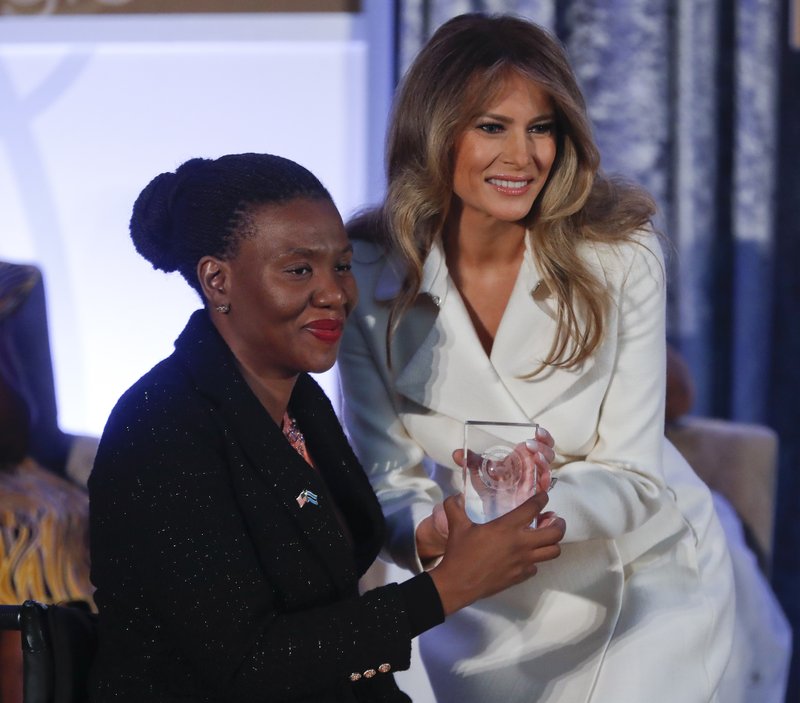
Melania Trump helped present State Department awards Wednesday to 13 women from around the globe who were recognized for demonstrating courage and leadership in the face of adversity, a group she praised a “true heroes.” The first lady, on her first visit to Cabinet department, joined Thomas Shannon, undersecretary of state for political affairs, to present the Secretary of State’s International Women of Courage Award. Secretary of State Rex Tillerson was traveling to Turkey. The award is given to women around the world who have shown courage and leadership while advocating for peace, justice, human rights, gender equality and women’s empowerment — often at personal risk. One of the honorees, Natalia Ponce de Leon, of Colombia, started a foundation to defend and protect the human rights of victims of acid attacks after a stalker doused her face and body with sulfuric acid in March 2014. Another woman, Malebogo Molefhe, of Botswana, became an advocate for female victims of gender-based violence after she was attacked, including being shot eight times, by an ex-boyfriend in 2009. She uses a wheelchair due to extensive spinal cord injuries suffered during the assault. During brief remarks, Mrs. Trump asked the audience of women and girls to imagine being any of the 13 women on the stage with her. “Ask yourself if you would have the fortitude of spirit, the courage of your convictions and the enormous inner strength required to stand up and fight against such overwhelming odds,” she said. “Amazingly, each of our honorees has courageously answered ‘Yes’ to those questions.” “These honorees, who have fought on the front lines against injustice, are true heroes,” she continued, adding that their bravery is a reminder that “there is always hope whenever the human spirit is brought to bear in the service of others.” Wednesday’s honorees hail from Bangladesh, Botswana, Colombia, the Democratic Republic of Congo, Iraq, Niger, Papua New Guinea, Peru, Sri Lanka, Syria, Turkey, Vietnam and Yemen. In April, the women will take part in a State Department-sponsored exchange program in several U.S. cities. More than 100 women from more than 60 countries have been recognized with courage awards since 2007, the department said. Mrs. Trump participation in the award ceremony amounted to a rare public appearance for her in Washington, outside of the White House. She hosted a White House luncheon for International Women’s Day earlier this month. Wednesday’s appearance fell in the middle of a busy week for the first lady in the nation’s capital. She and President Donald Trump hosted a White House reception Tuesday night for all 100 U.S. senators and their spouses. Mrs. Trump also planned a third appearance Thursday in Washington, but the White House has not released any details. Since her husband’s Jan. 20 inauguration, the first lady has lived mostly at the family’s Trump Tower penthouse in midtown Manhattan with the couple’s son, Barron, who recently turned 11. She often meets the president in Palm Beach, Florida, when he spends weekends at his waterfront estate there. Trump has said his wife and son will move to the White House after Barron’s school year ends. Republished with permission of The Associated Press.
State Department news briefings to resume week of March 6
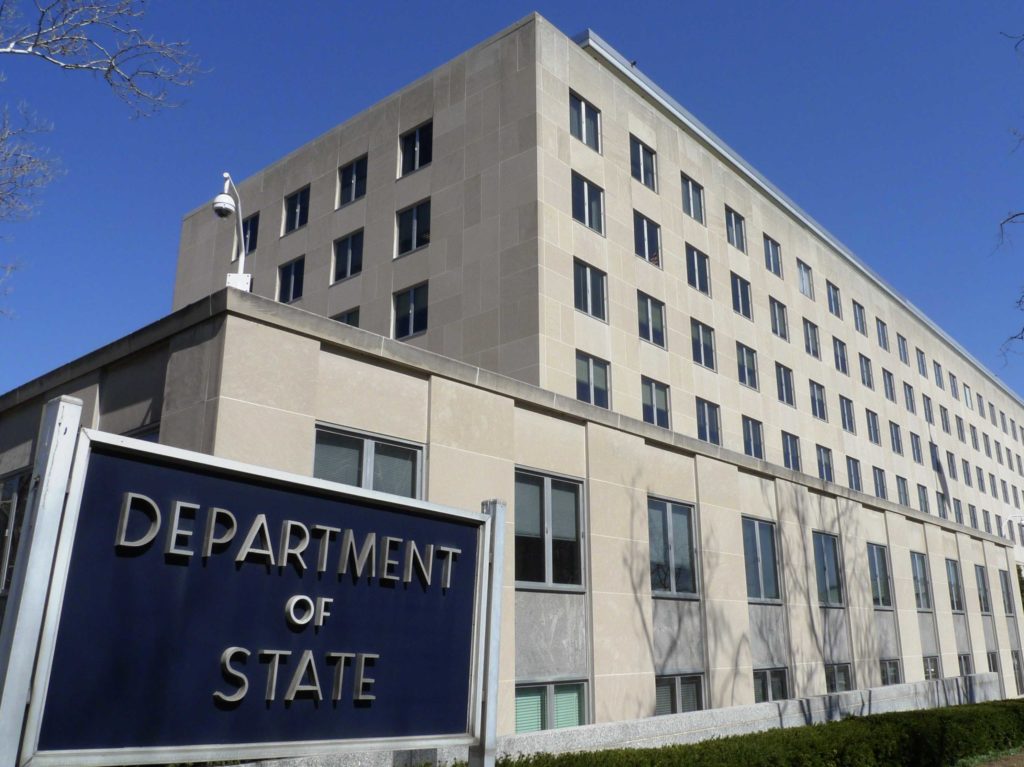
The State Department says it will resume regular press briefings early next month. It has been criticized for not holding a briefing since President Donald Trump’s inauguration. The department said Friday it would begin hosting the briefings during the week of March 6. The last briefing was Jan. 19, the last full day President Barack Obama‘s time in office. The hiatus is believed to be the longest since the department began holding news briefings in the 1950s. Officials have remained available to answer reporters’ questions despite the lack of televised briefings. Those are watched closely by foreign governments, and some current and former diplomats have expressed concern the absence of the briefings was allowing other countries to drive foreign policy debates. Republished with permission of The Associated Press.
Benghazi emails involving Hillary Clinton recovered by FBI, State Department says
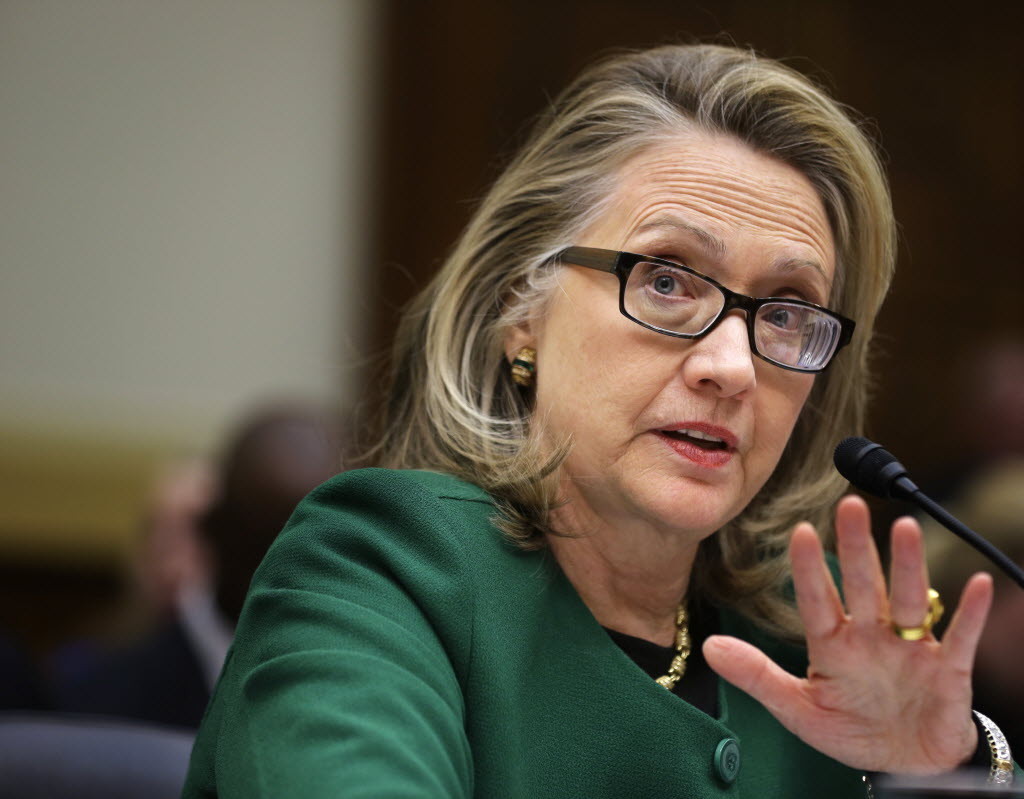
The State Department says about 30 emails involving the 2012 attack on U.S. compounds in Benghazi, Libya, are among the thousands of Hillary Clinton emails recovered during the FBI’s recently closed investigation into her use of a private server. Government lawyers told U.S. District Court Judge Amit P. Mehta Tuesday that an undetermined number of the emails among the 30 were not included in the 55,000 pages previously provided by Clinton to the State Department. The agency said it would need until the end of September to review the emails and redact potentially classified information before they are released. The hearing was held in one of several lawsuits filed by the conservative legal group Judicial Watch, which has sued over access to government records involving the Democratic presidential nominee. The State Department has said the FBI provided it with about 14,900 emails purported not to have been among those previously released. Clinton previously had said she withheld and deleted only personal emails not related to her duties as secretary of state. In a separate development Tuesday, a law enforcement official told The Associated Press that the FBI is expected to release documents soon related to its investigation, which focused on whether Clinton and her aides mishandled government secrets. The official, who was not authorized to discuss the matter by name and spoke on condition of anonymity, said documents in the case would be made public as the FBI responds to Freedom of Information Act requests. It wasn’t immediately clear when the documents would be released or exactly what they would include. Though he described Clinton’s actions as “extremely careless,” FBI Director James Comey said his agents found no evidence that anyone intended to break the law and said “no reasonable prosecutor” would have brought a criminal case. The FBI this month provided Congress portions of its file from the agency’s yearlong investigation. The FBI interviewed Clinton for several hours at FBI headquarters in Washington just days before announcing its decision to close the investigation. The Justice Department accepted the FBI’s recommendation. CNN reported that the records could be made public as early as Wednesday. Republished with permission of The Associated Press.
Government seeks to limit questions in Hillary Clinton email case
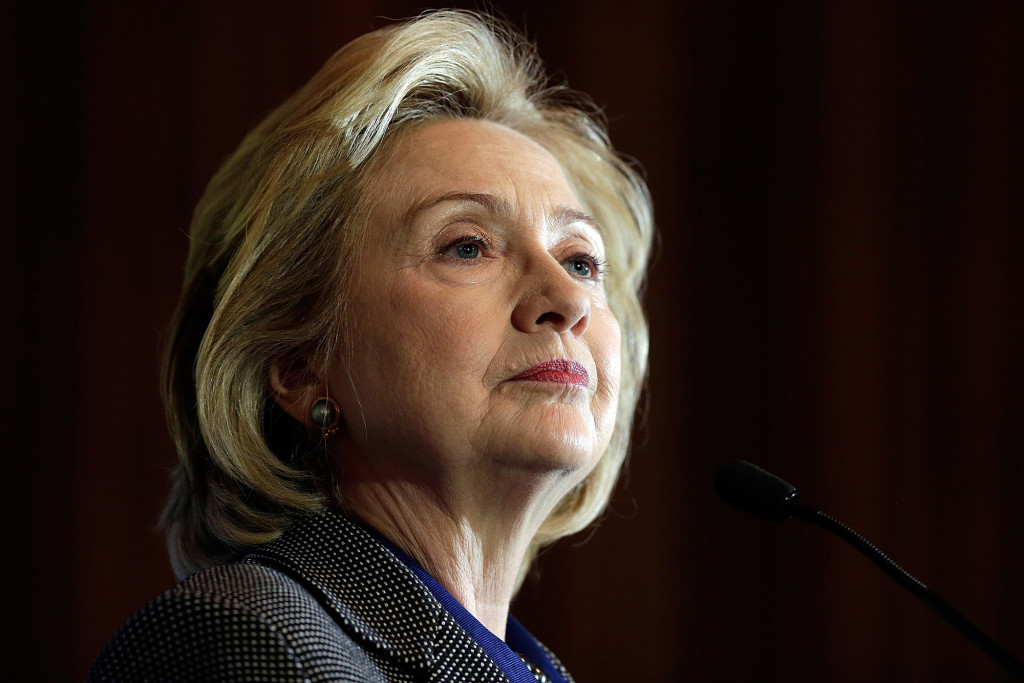
Lawyers for the State Department have asked a federal judge to limit the scope of testimony about Hillary Clinton‘s use of a private email account as secretary of state. The government filed its response late Tuesday in a public records lawsuit filed by Judicial Watch, a conservative legal advocacy group. Federal District Court Judge Emmet Sullivan last month granted the group “limited discovery” into why the Democratic presidential front runner used an email server at her New York home while serving as the nation’s top diplomat. Judicial Watch wants to question eight current and former department staffers under oath, including top Clinton aides Cheryl Mills and Huma Abedin. In its response, the government asked the judge to strictly limit the questions that can be asked to those involving the 2009 creation of Clinton’s private email system. Topics the government asked Sullivan to forbid include the “employment status of a single employee; the storage, handling, transmission, or protection of classified information, including cybersecurity issues; and questions about any pending investigations.” The FBI is investigating whether sensitive information that flowed through Clinton’s email server was mishandled. The inspectors general at the State Department and for U.S. intelligence agencies are separately investigating whether rules or laws were broken. There are also at least 38 civil lawsuits, including one filed by The Associated Press, seeking records related to Clinton’s time as secretary of state from 2009 to 2013. Critics of Clinton’s decision to rely on the private server have suggested it potentially made her communications more vulnerable to being stolen by hackers, including those working for foreign intelligence agencies. In response to public records requests, the State Department has released more than 52,000 pages of her work-related emails, a small percentage of which have been withheld because they contain information considered sensitive to national security. Thousands of additional emails have been withheld by Clinton, whose lawyers say they contain personal messages unrelated to her government service. Clinton has admitted on the campaign trail that her home-based email setup was a mistake, but insists she never sent or received any documents that were marked classified at the time. Republished with permission of the Associated Press.
Hillary Clinton emails: GOP sues, senators press attorney general
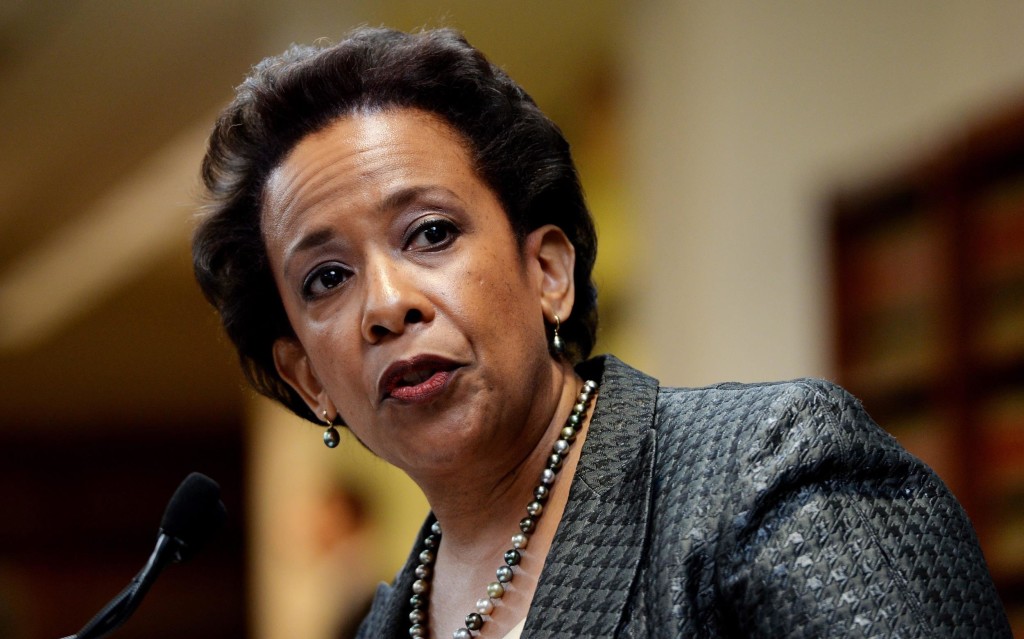
Republican senators pressed for more information Wednesday about an FBI investigation into the potential mishandling of sensitive information that passed through former Secretary of State Hillary Clinton‘s private email server, and their party sued for copies of the messages. The Republican National Committee filed two lawsuits in U.S. District Court in Washington over access to electronic messages sent or received by the Democratic presidential candidate and her top aides during her time as the nation’s top diplomat. Both spring from Freedom of Information Act requests filed last year seeking copies of emails and text messages. In court filings, the GOP says it has not received any documents in response to the requests. The GOP litigation brings the total to at least 34 civil suits so far involving requests for federal records related to Clinton’s service as secretary of state between 2009 and 2013. The Associated Press is among those with a pending case at the Washington courthouse. “For too long the State Department has undermined the public and the media’s legitimate right to records under the Freedom of Information Act, and it’s time it complies with the law,” said RNC Chairman Reince Priebus. The State Department has released more than 52,000 pages of Clinton’s work-related emails, but her private lawyers have withheld thousands more that they deemed to be personal communications unrelated to her job. Also left unresolved are questions about how Clinton and her closest aides handled classified information. The AP last year discovered Clinton’s use of the private email server, which had been set up in the basement of Clinton’s New York home by former State Department staffer Bryan Pagliano, for her to use exclusively for her work-related emails while she was secretary. The FBI for months has investigated whether sensitive information that flowed through Clinton’s email server was mishandled. The State Department has acknowledged that some emails included classified information, including at the top-secret level. Clinton has said she never sent or received anything that was marked classified at the time. The inspectors general at the State Department and for U.S. intelligence agencies are separately investigating whether rules or laws were broken. Members of the Senate Judiciary Committee questioned Attorney General Loretta Lynch on Wednesday about media reports that the Justice Department had offered Pagliano immunity from criminal prosecution in exchange for his cooperation. Pagliano previously declined to testify before Congress, citing his Fifth Amendment rights against self-incrimination. Sen. Chuck Grassley, the committee chairman, asked Lynch whether Pagliano’s immunity offer carried over to congressional committees. Grassley, R-Iowa, wants to recall Pagliano to testify if he has received immunity. Lynch declined to answer the question. “We don’t go into details with the agreements that we have with any witness on any matter in ongoing investigations,” the attorney general said. “The consistency with which the department handles ongoing matters, whether they involve a famous last name (or not), is something that we take very seriously,” Lynch said. “We treat them the same, and that is how the public takes confidence in the investigations we conduct.” Lynch also said she had not discussed the email investigation with anyone at the White House and did not plan to do so. Republished with permission of the Associated Press.
Presidential race shows evolving gender roles in politics

Carly Fiorina has a husband who quit his career to further hers. Chris Christie boasts of his wife being the family’s top earner. Hillary Clinton is looking to get back into the White House, but this time as president. In the 2016 presidential campaign, a modern take on gender roles is increasingly on display in both parties. With two women running for president, a number of high-powered career spouses in the mix and an increased focus on policies to support two-income families, 2016 is shaping up as a different kind of election, said Anne Marie Slaughter, who four years ago wrote a popular essay in The Atlantic on why she left a job in the State Department to spend more time with her family. “I think what is changing is, this is the year of the family,” said Slaughter, now president and CEO of New America, a Washington-based nonprofit. And that means more attention on “how you support the family with policies for women and men.” While more women have been running at a state and local level, this is the first time both parties have a woman running in a serious way. This gives former Michigan Gov. Jennifer Granholm reason to hope decisions about running for office are no longer just being made “based on one’s plumbing.” Compared with her 2008 run, heavy on national security, Clinton this time has heavily stressed issues that are meant to appeal to women and families: health care, pay equality, education, child care, family leave. She says “these aren’t just women’s issues, they are economic issues that drive growth and affect all Americans.” This is murky territory for Clinton. She has a long record as an advocate of women’s advancement and speaks often and passionately about her baby granddaughter. But her potential Republican rivals have raised questions not only about her husband’s past infidelities but about how she might have contributed to efforts to discredit some of the women known or alleged to have been involved with him. Donald Trump flatly accused her of enabling Bill Clinton‘s philandering. Among Republicans, Florida Sen. Marco Rubio has proposed increasing the child tax credit and creating a tax credit for employers that provide family leave. Rep. Paul Ryan asserted his need for family time when agreeing to become House speaker. Christie says voters are meeting a new generation of candidates with “different types of marriages and different types of relationships than people in the generation before. It really is necessitated by the increasing role and prominence of women in the workforce and by necessity, too.” Dianne Bystrom, director of the Carrie Chapman Catt Center for Women and Politics at Iowa State University, said that in recent years there has been a shift in both how female candidates talk about their personal lives and family-oriented policies. The political reasons are clear. “The Democrats have to mobilize the base and the Republicans have to whittle away at the women’s vote,” said Debbie Walsh, director of the Center for American Women and Politics at Rutgers University. Support from women, who typically lean toward Democrats, was vital for President Barack Obama, who won re-election in 2012 with 55 percent of female voters, while Republican opponent Mitt Romney won 52 percent of men, according to exit polls analyzed by Walsh’s center. Obama won about the same percentage of women in 2008 as he did in 2012. The two-career marriages on display in the campaign are in keeping with the rise of women in the workforce. About 58 percent of working-age women were employed in 2012, compared with 38 percent in 1963, federal statistics show. Mothers work at even higher rates – with about 70 percent of women with children under 18 working. Christie’s wife, Mary Pat Christie, was a former Wall Street executive who out-earned him for most of their marriage. Heidi Cruz, wife of Texas Sen. Ted Cruz, is on leave from her job at Goldman Sachs. Jane Sanders is a key adviser to husband Bernie Sanders. And Fiorina’s husband, Frank, was a corporate executive until he retired early to support her high-powered career. With a more diverse group campaigning, the role of political spouse may get a reboot. Ex-President Clinton and Frank Fiorina are campaigning in Iowa as potential “first gentlemen.” Many of the other spouses are out on the trail. The campaign has also gone beyond the usual (and still ubiquitous) sugar-coating of family life of the candidates, as Fiorina discussed the stepdaughter she lost to drug and alcohol addiction, Jeb Bush opened up about the daughter who’s struggled with drug abuse and Christie acknowledged a complicated marital history. Still, stereotypes tend to die hard. During a recent Republican debate, Christie seemed caught in a time warp back to the 1950s when talking about Los Angeles families dealing with a terrorist scare. “Think about the mothers who will take those children tomorrow morning to the bus stop wondering whether their children will arrive back on that bus safe and sound,” he said. “Think about the fathers of Los Angeles, who tomorrow will head off to work and wonder about the safety of their wives and their children.” And then there’s Trump, who has tossed various sexist insults at certain women – saying at one point that a debate moderator had “blood coming out of her wherever” – yet insists at rallies that he would “cherish women” as president. Republished with permission of the Associated Press


